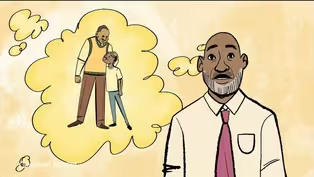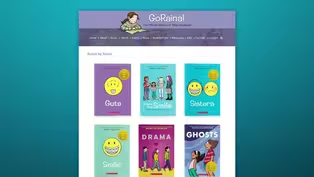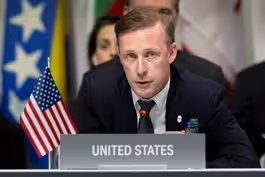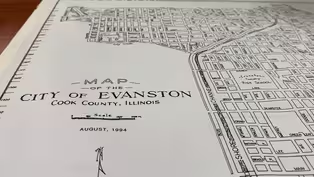

June 16, 2024 - PBS News Weekend full episode
6/16/2024 | 26m 45sVideo has Closed Captions
June 16, 2024 - PBS News Weekend full episode
Sunday on PBS News Weekend, Nick Schifrin talks with national security adviser Jake Sullivan about the wars in Ukraine and Gaza. Then, a look at the conservative legal challenge to an Illinois city’s groundbreaking reparations program. Plus, graphic novelist Raina Telgemeier discusses her books that try to reassure anxious adolescents that they are not alone.
Problems playing video? | Closed Captioning Feedback
Problems playing video? | Closed Captioning Feedback
Major corporate funding for the PBS News Hour is provided by BDO, BNSF, Consumer Cellular, American Cruise Lines, and Raymond James. Funding for the PBS NewsHour Weekend is provided by...

June 16, 2024 - PBS News Weekend full episode
6/16/2024 | 26m 45sVideo has Closed Captions
Sunday on PBS News Weekend, Nick Schifrin talks with national security adviser Jake Sullivan about the wars in Ukraine and Gaza. Then, a look at the conservative legal challenge to an Illinois city’s groundbreaking reparations program. Plus, graphic novelist Raina Telgemeier discusses her books that try to reassure anxious adolescents that they are not alone.
Problems playing video? | Closed Captioning Feedback
How to Watch PBS News Hour
PBS News Hour is available to stream on pbs.org and the free PBS App, available on iPhone, Apple TV, Android TV, Android smartphones, Amazon Fire TV, Amazon Fire Tablet, Roku, Samsung Smart TV, and Vizio.
Providing Support for PBS.org
Learn Moreabout PBS online sponsorshipJOHN YANG: Tonight on PBS News Weekend, National Security Adviser Jake Sullivan sits down with Nick Schifrin to talk about the wars in Ukraine and Gaza.
Then the conservative legal challenge to win Illinois City's groundbreaking reparations program.
And graphic novelist Raina Telgemeier, whose books try to reassure anxious adolescents that they're not alone.
RAINA TELGEMEIER.
Cartoonist and Author: I'm just trying to write for my own inner nine year old and to kind of reassure her that she's going to get through a stressful experience.
(BREAK) JOHN YANG: Good evening, I'm John Yang.
The Israeli military says it will limit fighting in a small area of southern Gaza in order to allow more aid to reach Gazans desperately in need of food.
Daytime military operations will pause along a seven mile stretch of road between the Kerem Shalom crossing with Israel and a hospital near Khan Younis.
The pace of aid shipments destined for Gaza slowed when Israel closed the Rafah crossing with Egypt.
Far-right ultranationalist and Prime Minister Benjamin Netanyahu's coalition government quickly condemned the move.
All of this unfolded as world leaders gathered in Switzerland for a Ukraine peace summit where White House National Security Adviser Jake Sullivan played a key role.
He sat down one on one with foreign affairs and defense correspondent Nick Schifrin.
NICK SCHIFRIN: I want to get to Ukraine and the peace summit.
But let me just ask you first to respond to an Israeli Defense Forces announcement this morning of what they're calling, quote, a tactical humanitarian pause from 8:00 a.m. to 7:00 p.m. every day leading from Kerem Shalom, the crossing between Israel into Gaza, going toward Rafah, how significant is that announcement?
JAKE SULLIVAN, National Security Advisor: It's significant.
This is a good and important step, because we've made a huge amount of progress in getting aid into Gaza, including the work that President Biden did to get Kerem Shalom back open a few weeks ago after the rough operation began.
But the issue now has been getting aid around Gaza so that people can get access to life saving food, and medicine and water.
And what this tactical pause will allow for is the free flow of humanitarian trucks without a concern that they could be targeted or delayed because of military operations.
That's going to help the people of Gaza and this is something that the Israeli Defense Forces deserve credit for.
And the U.N. deserves credit for it as well, because it was through a consultation between the U.N. and the IDF that this came to pass with the support in the United States.
NICK SCHIFRIN: The U.N. blames Israel for blocking some of the movement of trucks.
And there's still a shortage of vast shortage of trucks inside of Gaza.
This doesn't change that, does that?
JAKE SULLIVAN: No, the issue of just the number of trucks has remained a persistent problem, one that we have worked to try to solve by increasing the flow, not just the flow in and out of trucks, but the overall stock of trucks that can move goods around Gaza.
We've made some progress in that regard working with the U.N. who contracts for new trucks to be brought in.
There's more progress that's required.
And of course, when you're in a war zone like this, there's always going to be difficulty in the distribution of humanitarian aid.
And that's why we have worked so hard to encourage the Israelis to take every measure possible, including humanitarian pauses to help make the life as easy as possible for humanitarian organs.
NICK SCHIFRIN: But I assume you are still calling for the idea for the Israelis to take as many steps as they can to alleviate some of these channels.
JAKE SULLIVAN: Of course we are and even beyond that, and this is a critical point.
We are not going to get to a fully satisfactory humanitarian situation until there is a ceasefire.
That's why President Biden has called for a ceasefire and hostage deal.
He'd like to see an end to the hostilities and end to the war, because it's only in that circumstance, that the people of Gaza can be fully safe and have full and complete access to the humanitarian needs that that they so badly have, you know, been struggling to get over the course of the past several months.
NICK SCHIFRIN: Let's move here to Switzerland and Ukraine.
What can you accomplish at a peace summit that Russia is not attending, nor is China that has helped rebuild Russia's defense industrial base, and countries like Saudi Arabia and Kenya, are calling on Ukraine and Russia to negotiate directly?
JAKE SULLIVAN: Well, first, Ukraine has made clear President Zelenskyy has made clear including here in Switzerland that ultimately, this war will have to be determined at the negotiating table.
The United States, his goal has been to put Ukraine in as strong as possible a position on the battlefield.
So it is as in as strong a position as possible at the negotiating table.
But its strength at the negotiating table will also be improved by what's happened here in Switzerland, because you have more than 100 countries and international organizations coming together to lay a foundation for a just peace built on a simple proposition.
You cannot take territory by force.
It says that in the United Nations Charter, it's at the core of international law, Ukraine's sovereignty and territorial integrity has to be respected.
And the fact that you have a broad chorus of countries, not just from Europe, not just the United States, but from around the world saying this, that is going to strengthen Ukraine's hand when it eventually negotiates with Russia.
And that's up to Ukraine to decide when and how that occurs.
NICK SCHIFRIN: You said this weekend that China is not here, because it quote, obliged Putin, who's calling the shots and the so called No Limits relationship?
JAKE SULLIVAN: Well, look, each country makes its own decision.
But it certainly looks to us like Russia went to China and said, please don't go and China obliged.
We think that that's not a positive sign for China's commitment to adjust peace in Ukraine, because Russia only gets more and more extreme in its demands, including what President Putin said just recently.
And if you look at the range of countries present here, and the basic outcome of this summit, which is a reaffirmation of U.N. Charter principles that China itself signed up to China should be here and China should be supporting a just peace based on those principles.
And based on international law, the fact that it's siding with Russia on this issue, I think is not a positive development.
JOHN YANG: More of next conversation with Jake Sullivan will be on tomorrow's PBS NewsHour.
Summertime activities in two states erupted into summertime violence this weekend.
An altercation at a Juneteenth event in Round Rock, Texas late last night left two people dead and six others wounded two of them children.
Police said the two dead weren't involved in the dispute that led to the shooting.
And nine people were wounded in a shooting at a suburban Detroit splash pad park where families had gathered in the summer heat.
Two brothers eight and four years old and their mother remain hospitalized.
The gunman leader apparently killed himself.
Police said the incident appeared to be random at that the suspect had a history of mental health challenges.
In Russia state media says security forces stormed the detention center after inmates took two guards hostage.
It happened in southern Russia.
Several of the inmates involved have been accused of links to the Islamic State.
Local news outlets say some of the prisoners were killed.
This is the second deadly attack in Russia this year linked to the Islamic State in March gunmen killed 145 people at a concert hall in suburban Moscow.
And an oil spill at one of Singapore's most famous beaches is raising environmental and economic concerns.
Cruise tried to contain the spill after a Dutch flag dredger had a stationary Singaporean fuel supply ship on Friday.
But ocean currents pushed to the oil onshore.
It's closed parts of the beaches on the resort island of Sentosa off Singapore's southern coast.
Still to come on PBS News Weekend, graphic novelist Raina Telgemeier talks about the effect Chromebooks have on young readers and on this data on her dad's one man explains the influence his father had on him.
(BREAK) JOHN YANG: Wednesday is Juneteenth the Federal holiday celebrating the emancipation of enslaved people in America.
This year it comes amid renewed debate about reparations for the descendants of people who are enslaved and of the victims of Jim Crow laws well into 20th century.
In 2021, the Chicago suburb of Evanston, Illinois became the first U.S. city to offer reparations to black Americans for past housing discrimination.
Now, a conservative legal group is challenging the program in court saying it unconstitutionally discriminates against residents who aren't black.
Brandis Friedman anchors Chicago tonight on PBS member station WTTW in Chicago.
Brandis give us a little sense of the background of this program, who qualifies for it and how much money has been paid out?
BRANDIS FRIEDMAN, Anchor, WTTW: Hey, John.
So this, you know, came about sometime after 2020.
Of course, I think a lot of folks, a lot of cities were starting to talk about reparations in a way that they hadn't in the past.
And so Evanston measure, it requires that anyone who is 18 or older, and was a resident of the city of Evanston between 1919 and 1969, or is a descendant of a resident between that same time period, is eligible to receive the benefit, right.
And so the benefits are $25,000, initially $25,000 to go towards housing.
So the first part of the $20 million that the city has pledged is a housing initiative where folks who fit the bill can either make a down payment on a new house, or they can repairs maintenance upgrades to their homes, or use that fund or use those funds to pay back if they owe penalties to the city.
At this point, I think initially, some of that rollout was a little bit slow.
But I think approximately 3 million or so has been paid out thus far.
Last year, the city also added on to that where the same group of people who meet the requirements could receive a $25,000 direct cash payment.
JOHN YANG: Is there much public support for this in Evanston?
BRANDIS FRIEDMAN: There is quite a bit, you know, initially when this was passed, not everyone was supportive, right?
There were some folks who argued that this is not a reparations package that this is, you know, a package for the mortgage lenders and for the banks and for the city.
But you know, the folks who would actually be receiving those $25,000 and then later on, there was the $25,000 cash payment option that was added, you don't hear a lot of opposition in the area, I think a lot of folks are still kind of waiting to see as that money gets passed out, you know, as it gets distributed to those who are eligible to see the benefit and how it's helped them.
JOHN YANG: For those who don't know, Evanston just describe it for us politically, demographically.
BRANDIS FRIEDMAN: SureSo Evanston sits just north of the city of Chicago on what is called the North Shore.
It's at the bottom edge of the North Shore, just outside the city.
Some folks call it urban light, because it's still, you know, a thriving suburb.
Northwestern University is in Evanston.
Politically, it's pretty blue, as is, you know, a lot of Chicago specific, you know, as you were Chicago proper, I should say, once you get farther and farther out, the, you know, the politics start to change color a good bit.
JOHN YANG: The conservative legal group Judicial Watch is bringing this suit, what's their argument?
BRANDIS FRIEDMAN: So their argument is, I mean, I've read reverse racism, their main argument is that because the 14th Amendment, that this that the reparations package is a violation of the equal protection clause of the 14th Amendment, because the city of Evanston uses race as a proxy as a determining factor of whether or not someone experienced racism.
I think, you know, some critics of that argument would say the city of Evanston has admitted to its role in racism between the years of 1919 and 1969, as have many cities, whether out loud or not to the covenants, the restrictive covenants that prevented black people from living in certain neighborhoods, the redlining that we all know, the federal government and the, you know, mortgage lenders at the time all participated in that prevented that.
So that's their main argument.
The other part is that, you know, they believe that the federal government doesn't have really a compelling interest in making integration happen.
And the plaintiffs argue that, you know, that they too, should receive the $25,000 payments.
And so I think they are asking for an injunction against this legislation.
JOHN YANG: Is there any sense that the plaintiffs were emboldened by the Supreme Court's rejection of race aware college admissions?
BRANDIS FRIEDMAN: The attorney that I've spoken with Christine Spence, and she's locally based, but she does work with a Judicial Watch.
Yes, that I think that is part of their argument.
They believe that the Supreme Court has said that race can't be a factor in determining these kinds of things.
And so yes, they are certainly leaning on the Supreme Court's argument.
JOHN YANG: And what's the city said about the suit?
BRANDIS FRIEDMAN: They've been kind of quiet and not responding to the suit itself, which isn't a huge surprise.
A lot of times when students -- cities face legal suits like this, they're prevented from speaking about the suit itself, but they have said that they defend their legislation and that they are proud to the venue know the first city in the country to pass a reparations package and that they will defend it.
JOHN YANG: For serving the country to pass on reparations, but also, is this going to be closely watched this challenge?
BRANDIS FRIEDMAN: Absolutely.
It is going to be closely watched because as you mentioned, John, there are other cities even the state of California is considering and looking at how they might be able to employ meant their own reparations package and so I think some folks are keeping an eye on this one just to see what how far this case goes and what is decided and how it might impact others/ JOHN YANG: Brandis Friedman of WTTW in Chicago.
Thanks very much.
BRANDIS FRIEDMAN: Thank you.
JOHN YANG: Graphic novelist Raina Telgemeier has been described as like the Beatles for teenagers, and public appearances, their young fans have been known to stand on chairs jump up and down and wait in long lines for her autograph.
She's so popular because young people, especially middle schoolers, find her books so relatable.
She writes about feelings and emotions they may not want to or even know how to talk about with adults, adolescent anxiety, loneliness, embarrassment.
I recently sat down with Telgemeier to talk about her work and her legion of fans who know her by a single name, Reina.
That's also the name of her books main character.
RAINA TELGEMEIER: The young Raina in the books is me.
There are three books with the character Raina in them, they're all memoirs, they're all short stories about things that have happened to me in my life.
And so I'm not editing out, you know, my feelings.
I'm not editing out stuff that happened to me.
I'm just leaving it all in there for good or for bad.
So if it happens to Raina it in the book, it has happened to me in real life.
JOHN YANG: I wrote about how you started drawing.
You're a small girl, and you it sounds almost like self-prescribed therapy, you would draw your nightmares.
RAINA TELGEMEIER: I would.
Yeah, my mother tells the story that she made this blanket for me when I was a child.
And she took all of my drawings.
And she did a transfer process where she would put the drawings onto a big quilt.
And so the quilt maybe had 12 images on it.
And then she had it made and she got it back in the mail.
And she gave it to me as this beautiful gift.
And I saw the blanket and I started to cry.
Because every drawing that she had chosen, that to her look like fantastical images were things that I was scared of that I had just been a child sort of trying to process on paper.
So she had to put the blanket away for a while, but I haven't now.
And now I'm able to look at it.
And I don't remember those nightmares.
I don't remember those monsters.
JOHN YANG: But you still draw things that you're afraid of.
For instance, in guts, Raina has talks about her sort of anxiety about throwing up about vomiting.
And we have a drawing for that, is that still what you're doing?
RAINA TELGEMEIER: I do still have a lot of these same fears from my childhood.
I've obviously done a lot of work, and life experiences and adult has carried me this far.
But I'm still able to remember pretty distinctly what it felt like to be a child who was afraid of things and to be able to step back inside of those fears.
And in doing so, I mean, still to this day, I will feel my way through an experience in order to draw it.
So I do have to go through those same emotions as the creator now.
JOHN YANG: And then sisters, you talk about nothing.
So I've been sort of sort of more mundane, just the day to day friction of siblings.
RAINA TELGEMEIER: Yes.
JOHN YANG: Talk about that, what do you have siblings?
RAINA TELGEMEIER: I do.
I'm the oldest of three.
I've got a sister who is about five years younger than me and a brother who's eight years younger.
So not that my parents expected me to be the perfect sibling and the perfect, you know, role model for my brother and sister.
But I actually wanted to play with them.
I was excited to have new, you know, family members and new and new friends to play with and that they were their own individual people too.
And they didn't always care about the stuff I did.
So I was like, what do you mean, you don't want to play this board game with me?
Come on.
But my sister and I both love to draw.
So that was one of the things we have had in common from an early age, it might have given us a little bit of a competitive edge when we were younger.
But at the end of the day, I think it's something we both love doing together the language we share.
JOHN YANG: We talked about the reaction of your fans, public appearances, does that surprise you?
RAINA TELGEMEIER: I've been doing this long enough now that it has kind of come with me.
And a lot of these kids have sort of grown up with my books.
But then younger ones keep discovering them.
So there's never a shortage.
I always have nine year olds that I can talk to about how they're feeling these big feelings.
And they can relate so much to Raina and some of the other characters that I've written about.
So it doesn't surprise me now but it surprises me that it hasn't changed.
And if anything, it's gotten bigger in the last 10 years.
JOHN YANG: Readers of yours do talk about they feel that oh my god, there's someone else like me.
Is that what your main mission?
Is that what you want young people to take from your books?
RAINA TELGEMEIER: I don't think it's what I think about when I'm writing.
I'm just trying to write for my own inner nine-year old and to kind of reassure her that she's going to get through a stressful experience or an anxiety attack or whatever I'm focused on in the moment.
So I think in talking to my young self, I ended up talking to these kids as well.
JOHN YANG: What do your fans tell you when you meet them?
RAINA TELGEMEIER: They say things like thank you I'm so glad you wrote this book I'm so glad that I had this book to comfort me during a tough experience or a lot of kids told me that they didn't care about reading.
They weren't interested in books.
They had never read a book that they loved until they read, smile, or guts or drama.
And then now they're a reader.
Now they love to read.
And if I can be even just a piece of that puzzle for one kid, then I have done my job.
JONH YANG: Let's talk about the format.
It's a graphic novel.
What drew you to that format?
RAINA TELGEMEIER: I've loved comics since I was about nine.
Before that, I loved pictures and animation and breeding.
And so it was just kind of like all of my favorite things came together in one format that I could do on my own, I didn't have to hire somebody else to do art or a voice or produce a film, I could just sit down with my pencil and paper and make a story that had all of the things I loved in it.
And so I started making my own comics at about nine or 10.
And then I just never stopped.
I did it every day after school just as a way to kind of process my day and my friends and what I had been feeling.
So I didn't realize, but I was practicing every day for the job I would eventually have.
So it's not that I started at some point, it's just that it's who I've always been.
JOHN YANG: Have you ever thought about writing for adults that who may have been like Raina?
RAINA TELGEMEIER: Maybe I have thought about it, but it's never come to pass yet.
That's not to say that I won't I usually take at least a decade of process, a major experience, people have asked, will you write about COVID and the experience that all of us just live through?
And I think if I do it might be another 10 years from now, before I'm ready, and can see what I learned during that time.
JOHN YANG: You mentioned COVID, you mentioned there's so much going on with young people now school shootings, worries about the climate change, things like that.
Do you feel in a way that what you write about is particularly apt for our times?
RAINA TELGEMEIER: I think it worked out that way.
But I think there have always been kids who are sensitive and always, you know, their anxiety has probably been around as long as human beings have, it's nice to be able to put a spotlight on what's going on the inside because we're talking about these big events and these things that kids are going through but not necessarily how they're feeling about it.
So you know, showing them that it's okay to talk about it showing them it's okay to express your feelings on the outside.
That's part of what I think I would like to give to the world if I if I may.
JOHN YANG: Raina Telgemeier.
Thank you very much.
RAINA TELGEMEIER: Thank you John.
JOHN YANG: Finally, tonight for Father's Day, an animated feature from our partners at StoryCorps, Dr. William Lynn Weaver, are renowned surgeon helped integrate a Knoxville High School in 1964.
Even in those difficult times, he said he felt safe and supported thanks to his father, Ted Weaver, who worked long hours as a janitor and chauffeur.
Dr. Weaver who died in 2019 remembered his father's influence in this 2007 conversation with his daughter, Kimberly.
DR. WILLIAM LYNN WEAVER: My father was everything to me.
And it's actually kind of difficult, talking about him without becoming very emotional.
But until, you know, he had every decision I made, I'd always call him.
And he would never tell me what to do.
But he would always listen and say, well, what do you want to do?
And he made me feel that I could do anything that I wanted to do.
I can remember when we integrated to schools that there were many times when I was just scared.
And I didn't think that I would survive, and I'd look up and he'd be there.
And whenever I saw him, I knew that I was safe.
You know, I always tell you that your mom was the smartest person I've ever met.
But I think my father ranks right up there as brilliant.
When I was in high school, I was taking algebra.
And I was sitting at the kitchen table trying to do my homework.
And I got frustrated.
So I just can't figure this out.
I'm just my father said what's the problem?
He came by?
He's what's the problem?
And I said, as this algebra and he said, well, let me look at I said that they didn't have algebra in your day.
And I went to sleep.
At around four o'clock that morning, he woke me up.
He said, Come on, son get up.
He set me at the kitchen table.
And he taught me algebra.
What he had done is set up all night and read the algebra book.
And then he explained the problems to me, so I could do and understand.
And to this day, I live my life trying to be half the man my father was, just after me (ph).
And I will be a success if my children love me half as much as I love my father.
JOHN YANG: Now online how researchers and medical experts are trying to better understand why every year as many as a million pregnancies in the United States and in miscarriage.
All that and more is on our website pbs.org/newshour.
And that is PBS News Weekend for this Sunday.
On Monday, more from Nick Schifrin's interview with national security adviser, Jake Sullivan.
I'm John Yang.
For all of my colleagues, thanks for joining us.
Have a good week.
A Father’s Day story of one dad’s influence on his son
Video has Closed Captions
Clip: 6/16/2024 | 2m 31s | A Father’s Day story of one dad’s lasting influence on his son (2m 31s)
How Raina Telgemeier’s books help kids handle ‘big feelings’
Video has Closed Captions
Clip: 6/16/2024 | 7m 25s | How Raina Telgemeier’s graphic novels teach kids it’s OK to have ‘big feelings’ (7m 25s)
National security adviser Sullivan on the Gaza, Ukraine wars
Video has Closed Captions
Clip: 6/16/2024 | 5m 43s | National security adviser Sullivan: Ukraine’s territorial integrity ‘has to be respected’ (5m 43s)
What to know about a lawsuit against reparations in Illinois
Video has Closed Captions
Clip: 6/16/2024 | 5m 39s | What to know about a conservative lawsuit against reparations in Evanston, Illinois (5m 39s)
Providing Support for PBS.org
Learn Moreabout PBS online sponsorship
- News and Public Affairs

FRONTLINE is investigative journalism that questions, explains and changes our world.

- News and Public Affairs

Amanpour and Company features conversations with leaders and decision makers.












Support for PBS provided by:
Major corporate funding for the PBS News Hour is provided by BDO, BNSF, Consumer Cellular, American Cruise Lines, and Raymond James. Funding for the PBS NewsHour Weekend is provided by...



